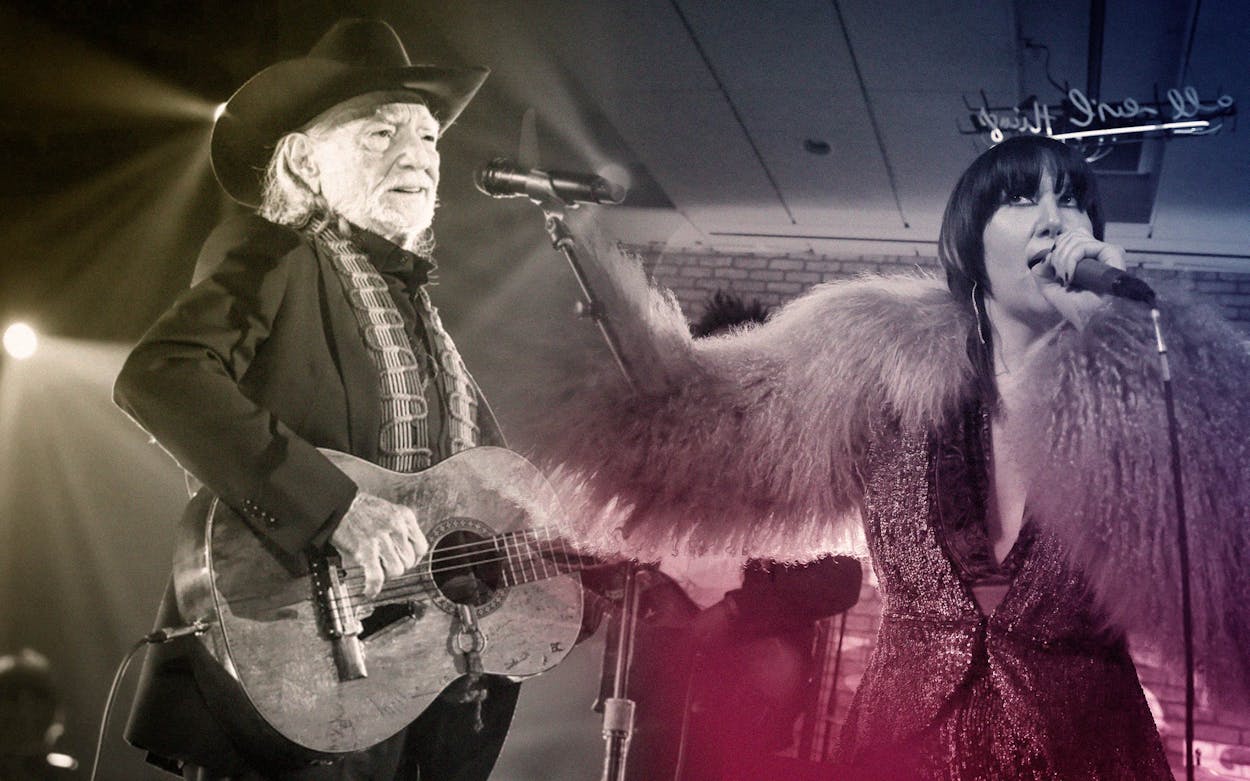The opening bass riff on the David Bowie/Queen collaboration “Under Pressure” is one of the most famous in the world. You’ve likely heard it approximately one million times in your life—at sporting events, karaoke bars, occasionally even when someone would play “Ice Ice Baby,” which shamelessly stole it—and yet you probably did not know that it could make you cry.
That’s because, until today, you had not heard “Under Pressure” as a contemplative, acoustic duet sung by Willie Nelson and Yeah Yeah Yeahs singer Karen O, who released a cover of the song on Wednesday afternoon. Let’s start by taking five minutes to listen to it.
This version maintains the iconic bass line in its intro. It starts with Karen O singing the opening chorus by herself, before Willie comes in to join her, singing the David Bowie part. At that point, the bass drops off, and bright acoustic guitar carries the song’s melody. The two join their voices for the song’s famous “people on the streets” breakdown, eschewing the falsettos of its original performers for something more contemplative.
Then Willie takes over the song. He takes the bridge and turns it into a classic Willie Nelson song, one where the singer mournfully looks back on a life of indecision, before asking a vital question. “Why, why, why,” Willie sings, like Bowie before him, until he reaches the conclusion: “Love, love, love, love.” Then he and Karen O sing together once more, in warm, compassionate tones, about the people on the streets, living their lives under pressure.
All of that is stuff you’ve heard every time you’ve heard the song, but it sounds different in this interpretation. That’s intentional, according to Karen O. In a statement announcing the release of the recording, she notes that the performances by Bowie and Freddie Mercury are “so exhilarating you get swept away in the high of that duet,” which might lead a listener to miss the power of their words. This version is intended to be more intimate.
It succeeds at that. The track is subdued, with only minimal percussion, and the bass line appears only at the song’s beginning and end. Otherwise, it’s mostly acoustic guitar, pedal steel, and soaring backing vocals behind the two singers. And because Willie’s voice manages to sound warm and familiar in every setting, whether he’s singing “Can I Sleep in Your Arms Tonight” or “Frosty the Snowman,” it allows him to excavate the layers that Karen O, who orchestrated the recording, identified underneath the original recording’s bombast. Together, the two sound like they’re making an inter-generational pact to the themes of the song. Willie is 45 years older, and the two come from wildly different backgrounds. She’s an immigrant raised in New Jersey in the eighties, while he lived his early years in rural Texas during the Depression; when, after alternating lines for most of the song, they converge on the outro to each sing that “love dares you to care for the people on the streets,” their vocals disjointed, it feels like a promise. The two voices come together out of time, out of harmony, to reach the same conclusion.
That’s a lot of heady stuff for a duet that came together more or less by accident, but it’s all there for the listener. In her statement, Karen O explains how she ended up on a song with Willie: she had reached out to him through a mutual friend, Jackass star Johnny Knoxville, to see if he’d cosign an open letter seeking funding for independent music venues amid COVID-19. Her message included a throwaway line about being available for a duet anytime. “Willie’s daughter Amy very supportively said, ‘Have her send him the song and he’ll sing on it,'” Karen O writes in her statement. “I had to focus and pull a song out of the ether that was worthy of a living legend and spoke to the people in troubled times.”
That element to the collaboration is fitting too—”Under Pressure” was written in a single day by Bowie and Queen, which didn’t stop it from becoming one of the most famous songs of the twentieth century. In equally desperate times, there’s something thrilling in hearing that song in a new context.
More from TexasMonthly.com:
‘One by Willie,’ Episode 4: Jack Ingram on ‘I’d Have to Be Crazy’
Explore our Willie Nelson Special Issue
Watch an Animated Rendering of Willie Nelson From the All-Virtual Austin City Limits Music Festival
- More About:
- Music
- Willie Nelson








